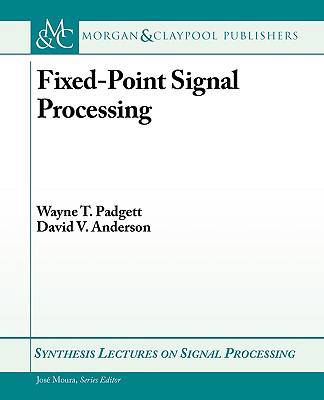
- Retrait gratuit dans votre magasin Club
- 7.000.000 titres dans notre catalogue
- Payer en toute sécurité
- Toujours un magasin près de chez vous
- Retrait gratuit dans votre magasin Club
- 7.000.0000 titres dans notre catalogue
- Payer en toute sécurité
- Toujours un magasin près de chez vous
Description
This book is intended to fill the gap between the "ideal precision" digital signal processing (DSP) that is widely taught, and the limited precision implementation skills that are commonly required in fixed-point processors and field programmable gate arrays (FPGAs). These skills are often neglected at the university level, particularly for undergraduates. We have attempted to create a resource both for a DSP elective course and for the practicing engineer with a need to understand fixed-point implementation. Although we assume a background in DSP, Chapter 2 contains a review of basic theory and Chapter 3 reviews random processes to support the noise model of quantization error. Chapter 4 details the binary arithmetic that underlies fixed-point processors and then introduces fractional format for binary numbers. Chapter 5 covers the noise model for quantization error and the effects of coefficient quantization in filters. Because of the numerical sensitivity of IIR filters, they are used extensively as an example system in both Chapters 5 and 6. Fortunately, the principles of dealing with limited precision can be applied to a wide variety of numerically sensitive systems, not just IIR filters. Chapter 6 discusses the problems of product roundoff error and various methods of scaling to avoid overflow. Chapter 7 discusses limit cycle effects and a few common methods for minimizing them. There are a number of simple exercises integrated into the text to allow you to test your understanding. Answers to the exercises are included in the footnotes. A number of MATLAB examples are provided in the text. They generally assume access to the Fixed-Point Toolbox. If you lack access to this software, consider either purchasing or requesting an evaluation license from The Mathworks. The code listed in the text and other helpful MATLAB code is also available at http: //www.morganclaypool.com/page/padgett and http: //www.rose-hulman.edu/padgett/fpsp. You will also find MATLAB exercises designed to demonstrate each of the four types of error discussed in Chapters 5 and 6. Simulink examples are also provided on the web site. Table of Contents: Getting Started / DSP Concepts / Random Processes and Noise / Fixed Point Numbers / Quantization Effects: Data and Coefficients / Quantization Effects - Round-Off Noise and Overflow / Limit Cycles
Spécifications
Parties prenantes
- Auteur(s) :
- Editeur:
Contenu
- Nombre de pages :
- 115
- Langue:
- Anglais
- Collection :
Caractéristiques
- EAN:
- 9781598292589
- Date de parution :
- 01-12-09
- Format:
- Livre broché
- Format numérique:
- Trade paperback (VS)
- Dimensions :
- 190 mm x 235 mm
- Poids :
- 244 g

Les avis
Nous publions uniquement les avis qui respectent les conditions requises. Consultez nos conditions pour les avis.






